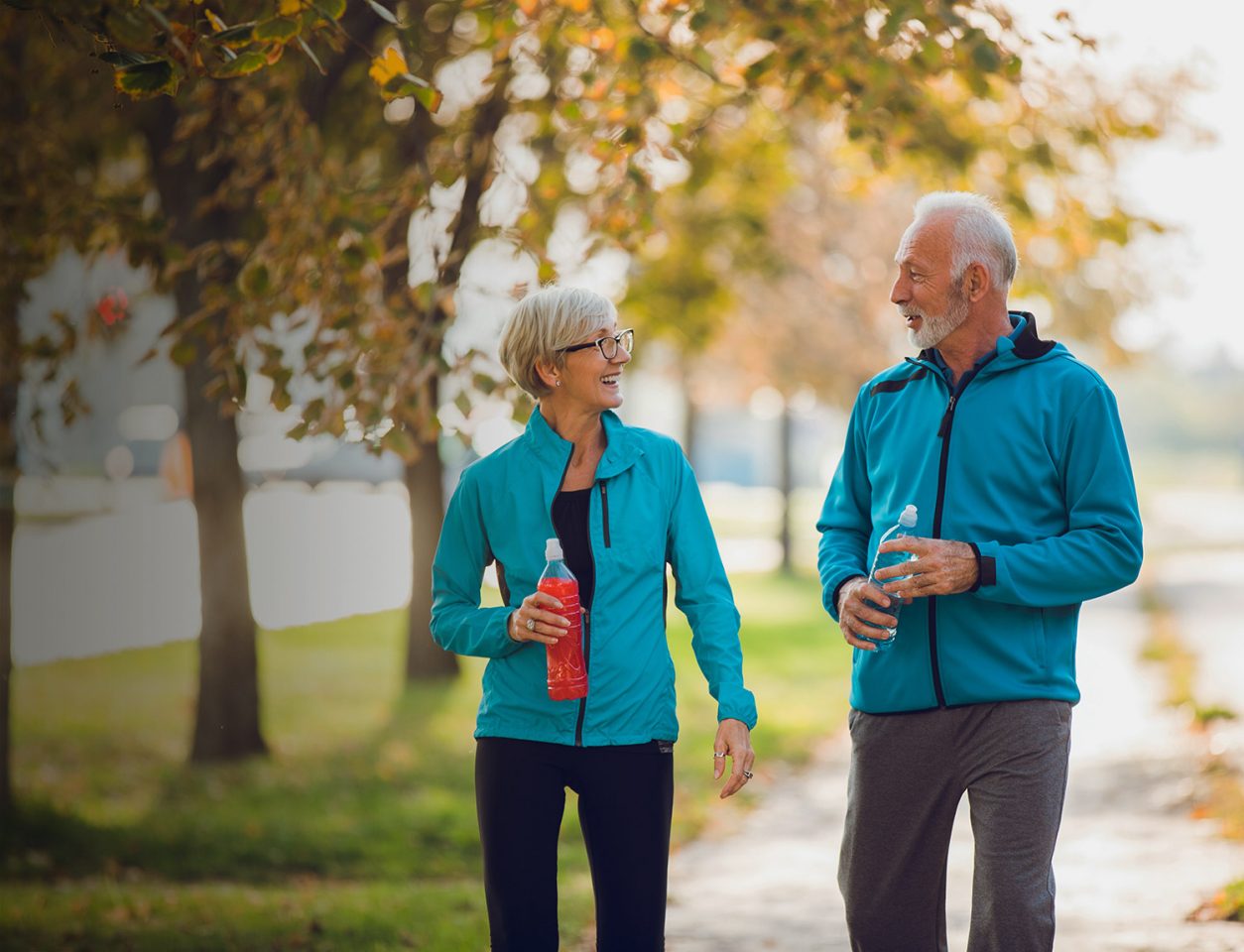Walk the walk
Walking is a simple and inexpensive way of looking after your physical and mental health, increasing your stamina and keeping off the pounds. It helps protect you from heart disease, strokes, cancer, depression and obesity, and improves your posture and circulation. Many sports-scientists now champion walking as a great, low-impact alternative to running and other more demanding activities. You don’t need pricy equipment or special skills and it’s easy to incorporate into your daily life. Here are eight useful tips to help you get more from your walking:
Something for everyone
Going for a walk is a great way for you to get fit, lose weight and reach your recommended target of 150 minutes of exercise per week. It suits people of all ages and body types, and you don’t need to learn techniques or travel to specialist facilities. Walking offers you an unlimited variety of routes and distances to suit your fitness and ability. You can go for a gentle stroll around the corner, or opt for a long-distance powerwalk, the choice is yours. Feel free to step out on your own, or join a group of walkers for a more social experience. Walking is the ideal workout if you suffer with obesity issues or knee, ankle and back problems. Being a relatively low-impact activity, walking lets you safely exercise for much longer with less chance of sustaining an injury. Remember, if you are recovering from a medical ailment or coping with an ongoing condition, it’s well worth seeking specialist advice about when to start your walking and how far to go.
Start slow and work up
If you haven’t exercised in a while, walking could be the perfect start to regaining your fitness. h At first, try short distances on flat terrain and take a break if you feel tired.You should be able to walk and talk easily at the same time. If not, and your breathing is very heavy, ease off. Even at a brisk pace (about three miles per hour) you should be able to recite complete sentences or sing a song as you walk. As your fitness improves, you can step up to longer walks, fewer rests and steeper hills. Don’t forget to stretch your leg muscles at the end of your walk to avoid those aches and pains the following day!
Be prepared
Walking doesn’t usually require extensive planning and there’s no need to pay out for costly clothing or footwear. Wear any comfortable shoes or trainers that give you plenty of support and don’t result in rubbing or blisters. Dress sensibly to suit the weather conditions and take some water or cold drink to keep you well hydrated on a hot day. For longer walks it makes sense to pack a snack, some sunscreen and a hat. If you’re walking somewhere unfamiliar, make sure you plan a realistic distance and have a map or guidance to help you find your way.
Everyday routine
Make walking a part of your daily routine. Where possible, use it as an alternative to the bus or car. Try allowing extra time and walking to work, your children’s school or the shops. If you have far to travel, why not get off the bus earlier or park the car further from your destination and walk the last part of your journey? Take a stroll in your lunch break, use stairs instead of a lift and, if your job involves a lot of sitting down, stand up and move around at every opportunity. Once walking becomes an everyday habit you’ll find yourself clocking up thousands of steps without knowing it.
Healthier and happier
Use walking to improve your overall fitness and wellbeing. The action of walking stimulates blood-flow in the legs, drives better circulation and builds a stronger heart. Regular, brisk walking also strengthens muscles and helps prevent the onset of conditions such as heart disease and type 2 diabetes. Different types of terrain exercise different muscle groups. For instance, uphill walking is an excellent workout for your calf muscles. Like many other forms of exercise, walking is good for your mental health too, by reducing stress and activating mood-boosting neurotransmitters in the brain. Walking further and faster grows your confidence and gives you a sense of achievement.
Altogether fitter
If you’re a dog walker you’ll know that walking can be a great way of meeting people. Joining a walking group can also help you make new friends, especially useful if you’re starting out as a walker and need some extra encouragement. Organisations like Ramblers arrange walks in towns, cities and rural locations across the UK for people of all ages and abilities. Groups can introduce you to new walking routes, provide helpful support and connect you to a whole new social network of fellow walkers.
Spice it up
With thousands of miles of footpaths to explore, the UK countryside offers an endless choice of safe, traffic-free walking. However, you don’t need to live in the country to enjoy a huge variety of interesting walks. Our towns and cities are full of rewarding walking routes in parks, woodlands, nature reserves, open spaces and along urban paths, heritage trails, towpaths and riversides. Discover new walks by checking with local tourist offices, contacting a walking group or visiting websites such as Walk Unlimited. Look out for special information about disabled access or use of pushchairs and buggies.
Take tech
Listening to a song or podcast while walking can make the time fly by. Music provides an easy rhythm to walk to and a welcome distraction from the step-by-step effort, especially if you’re walking alone. While some people see walking as a chance for technology downtime, others use their smartphones to enrich the walking experience. Apps and ‘wearables’ can map out your route, geo-locate your exact position and measure your speed, direction, calorie output and heartrate in real-time. You can then compare your stats from walk to walk, display as impressive graphs or charts and share with friends on social media.
August 9, 2018








